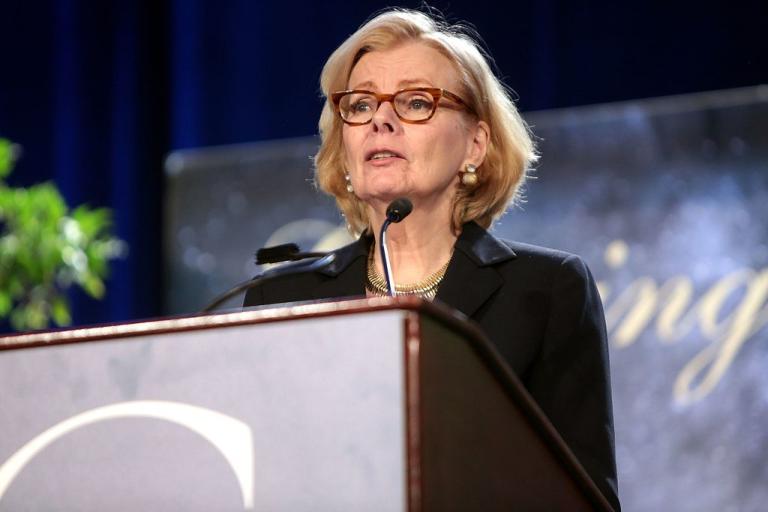Peggy Noonan has written a provocative article outlining the problems of both of our political parties.
Her Wall Street Journal column (behind a paywall) is entitled Our Political Parties Are Struggling, with the deck “The Democrats need normality; the Republicans need coherence. They both need to pull themselves out of the 20th century.”
She says that now that the overturning of Roe v. Wade has sent the abortion issue back to the states, Democrats, who have long branded themselves as the pro-abortion without limits party, have an opportunity. They have uncritically championed abortion, but at the expense of their moral authority. Therefore, many Americans, she says, cannot bring themselves to vote Democratic.
Now, in a national sense, the great agitating question is being taken off the board. The Democrats are free to be a normal party again, standing for things that are the normal concerns of parties (economics, war and peace). More voters would feel free to join.
Instead of seeing this they’ve replaced one stigma with another. Since at least 2020 they have aligned with or allowed themselves to be associated with another deeply agitating cultural question, the identity politics-wokeness regime. (It’s amazing we still don’t have an agreed upon word or phrase that fully captures this program.) Michael Lind, in a piece in the Tablet, sees it as composed of three parts, all falsely presented. The “Quota Project” uses anti-racism to pursue “social reconstruction.” The “Androgyny Project” goes beyond civil rights and ignores gay rights to “redefine all male and female human beings as generic, androgynous humanoids whose sex is a matter of subjective self-definition.” The “Green Project” uses climate change as an excuse to “radically restructure the society of the U.S. and other advanced industrial democracies.”
She says that this emphasis is a formula for losing? And yet Democrats are in thrall to this particular leftist ideology.
Why don’t they push back, hard—as a party? Most of their elected officials aren’t really on board with this stuff; many hate it. They know it limits their political prospects. America as it is currently constituted will never accept the regime, never be at peace with it, because Americans see it as a threat to their children and an insult to their sense of reality and fairness.
But Republicans are also shooting themselves in the foot.
The Republicans—where to start? They’re riven by policy disagreements, some of which stem from philosophical disagreements regarding what conservatism is and must be in the 21st century.
They haven’t decided if they’re a “limited government” party or a party that accepts, as it should, that the federal government will never be small in our lifetimes, and being mature means seeing that and turning the party’s focus toward the pursuit of more conservative ends, such as . . . helping families? Police the government, don’t spend like nuts, aim for growth, encourage dynamism, think long term.
Moreover, their bickering and failure to come up with coherent policies make it appear that the Republicans are incapable of governing. Also, they are taking positions that Americans as a whole just will not go along with.
Noonan cites the dysfunctions evident in the fight for Speaker of the House. But let me offer some other examples.
To get his Speakership, Kevin McCarthy agreed to bring to the floor certain proposals put forward by recalcitrant members of his party. One of them is to abolish the income tax, replacing it with a 23%-30% national sales tax.
Who thinks the American public would get on board with that? It has been said that if we were design the tax system from scratch, a consumption tax might be better than an income tax, but right now, hardly anyone would want such a radical change. The proposal will go nowhere, since this is a hobby horse of at most a handful of Congressmen. But this allows their Democratic opponents to say, “In this time of inflation, Republicans are wanting to raise the price of everything by 30%!”
Here is another example of conservatives cheerfully committing political suicide. In the opinion pages of The Wall Street Journal, Andrew G. Biggs, a fellow of the conservative American Enterprise Institute, offers an idea that would make Social Security more solvent: “If every senior simply received a benefit equal to the 2022 poverty threshold—just over $14,000 for a single retiree and about $17,600 for couples—Social Security’s $1.3 trillion annual cost for 2023 would be nearly cut in half.”
Well, yes. But imagine what the Democrats will say: “They want all retirees to be at the poverty line!”
Biggs adds, “Would capping the maximum benefit be enough to fix Social Security? Not even close.” So after recommending a tumultuous change that would have senior citizens, an important voting bloc that leans Republican, rioting like Antifa in the streets, he admits that this wouldn’t come close to solving the problem!
Yes, the problem needs to be solved. And, yes, Biggs is a conservative intellectual, not an elected official. And, yes, Speaker McCarthy has made it clear that cutting Social Security and Medicare is off the table in the debt ceiling debate. But such politically tone-deaf proposals, ones that might sound good in theory but would be politically impossible to implement, suggests a party that doesn’t know what it is doing.
One more example. Donald Trump feels threatened by Ron DeSantis, who has emerged as a possible rival in the upcoming Republican presidential primary. So, as is his wont, he goes into full attack mode. He has said that despite the Florida governor’s reputation for resisting much of the COVID overreach, he actually shut down Florida and “closed the beaches.”
But. . .but. . .Trump was the one who closed down the whole country in the first place! It was his administration that shut down American businesses, that hired Dr. Fauci as the leader of the anti-COVID effort, that mandated masks, rushed the vaccines into production, etc., etc.
Now those who support such policies, given what we knew then, should give Trump credit, although they almost never do. Conversely, one would think that COVID skeptics could hardly support Trump, though many of them do.
But for the president who ordered the shutdowns to attack an anti-lockdown governor for shutting down his state as the president ordered is just bizarre.
Do neither of the political parties want to win an election?
What do you think the prospects are?
Photo: Peggy Noonan by Gage Skidmore from Peoria, AZ, United States of America, CC BY-SA 2.0 <https://creativecommons.org/licenses/by-sa/2.0>, via Wikimedia Commons













